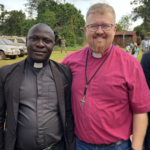
Redeemer’s Role In Launching Reach North America

“In short, we needed missionary bishops to lead mission in the second decade of the 21st century.”
HOW DOES REDEEMER FIT INTO REACH? That’s a question I’ve been asking myself for quite some time and you’ve probably been thinking as well. What I hope you will see is a picture of God’s redemptive imagination at work inside Redeemer.
Before I get to the answer, a short bit of history is needed.

When it all started
In 2008, two churches were started under the Anglican Mission in America (AMiA), a mission society dedicated to planting anglican churches. In 2015, both were merged together to form Redeemer. In a way, mission is the DNA that flows through our veins.
Many of the original churches started by AMiA went on to join other groups under more traditional structures. Some even have grown quite large. As I’ve looked at those places, what became apparent was those churches were actually established parishes that merely switched from one group to another. Whole congregations literally relocated their operations down a street, often leaving the former premises entirely empty.
That’s not mission. It’s relocation.
Redeemer was never a relocation project. It has been and continues to be a mission, “northing more, nothing less.”
In 2017, Redeemer relocated from Orlando to Casselberry. Since then, our congregation completely turned over, said goodbye to old friends and met new ones. Three years later the pandemic interrupted the world and brought everything to its knees, including our congregation.
When we began to meet again in July 2020, one thing was clear to me. Redeemer had to start over.
That was hard to accept.
But we did. With just four people, we began holding services again.
At first, we held out hope that those who left would return. But sadly, some chose to permanently say goodbye. As hard as it was not to internalize those goodbyes, I did. Each one hurt. Each one felt like a kick in the side when I was already down. I don’t think people realize just how hard the pandemic was for pastors. There is a reason why it was called, “The Great Resignation.” But God was gracious, bringing needed allies to encourage me to carry on.
During this same time, the pressures of the pandemic revealed the need for me to reassess my episcopal relationship. There were many problems that came to light, necessitating the need to pray and ask the Lord what was next? One of those problems was simply pragmatic. The Church of Nigeria had declared that no church would offer “online communion” during the pandemic.
That was not only absurd but seemed massively out of touch. How was that ministering at the time of need? This example along with others caused me to re-evaluate our relationships.
Post Pandemic Growth
After the pandemic eventually settled down, I sat out to undertake the difficult task of rebuilding Redeemer. It was not easy. I knew we had to make some changes. But those changes were made in light of the consequences of the trauma we had just endured.
Psychologists refer to this as “post traumatic growth.” That occurs where people develop a deeper understanding of who they are and what’s most important to them.
For me, the growth I experienced was the recognition that what we had done would not propel us forward to who I believe God called us to be.
So in January 2021, I sensed the Lord leading me to resign my license as a presbyter under the Church of Nigeria. I was still a priest in good standing and had multiple endorsements confirming such. But this left me and Redeemer without a bishop. Finding a way forward became my top priority. Who were we going to align?
One year later, early 2022, I called a leadership meeting at Redeemer. There I outlined two priorities — establish a new leadership structure and foster a relationship with a new bishop.
It was during this time when God made new connections and fostered dreams.
In late 2021, through mutual friends, I was introduced to Archbishop Bill Mikler, who lives just three exits up I-4 from my house.
Bishop Bill is originally from Central Florida and has watched the area grow, change, and evolve into what it is today. That made him the ideal bishop for Redeemer and a good ally for me. I needed someone familiar with the unique challenges facing our region.
We met, ate together, and prayed. And frankly, we just hit it off.
During this same time, God connected the two of us to another priest in New England, Fr. Brian Bethke. He, like me, had grown weary of the status quo and desired to participate in a fresh work of God. When we met, he was already in the process of launching new missionary endeavors in New England and desired to see a form of episcopacy emerge in the U.S. In talking, we discovered similar challenges facing both our areas.
It’s not a surprise that major urban areas like New England and Central Florida share common challenges. So Bishop Bill, Fr. Brian, and I began to meet once a week via Zoom, a nifty development of the pandemic, to discuss what God may be up too. As we met and prayed together, it became clear God was calling us to launch a new bishop led missionary society.
What became apparent to the three of us was the need to establish a work reminiscent of the Anglican Mission but adapted to plant new works in a pandemic-defined world. We needed 1) bishops consecrated in genuine apostolic succession, 2) charged with leading a new generation of apostles, prophets, evangelist, pastors and teachers, and 3) who were freed from the ecclesial politics that continues to characterize the anglican world. A missionary society satisfies all three.
In short, we needed missionary bishops to lead mission in the third decade of the 21st century.
Redeemer would become the soil that God planted this seed.
In December of 2022, the vision would become reality. On December 2 and 3, ironically Advent 1, Archbishop Bill along with three other bishops, consecrated Bishop Brian and I as missionary bishops in the one, holy catholic and apostolic church, charging us with this new mission. We then ordained five presbyters to help us develop Reach North America. All of this occurred at Redeemer.
While Redeemer is not Reach and Reach is not Redeemer, our congregation is the very soil God chose to plant the vine of a new mission. Such change is nothing short of God’s amazing work: to rescue, redeem, and restore. And as we move forward, I trust God to continue this incredible journey and to see it to fulfillment.




